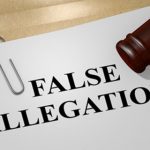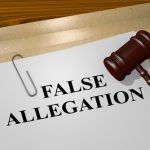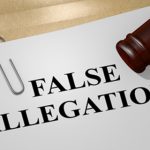Complainant’s History of False Sexual Assault Allegations is Inadmissible, Court Rules

A recent decision in the NSW Court of Criminal Appeal (NSWCCA) upheld a District Court decision not to allow evidence before a jury that suggests a woman has a history of making false sexual assault allegations, in a sexual assault trial that has raised eyebrows amongst this state’s legal professionals.
A five justice bench of the appeals court released its decision on 3 July 2020, which indicates that while there’s every suggestion a substantial problem exists with the law that led to the evidence being ruled inadmissible in its entirely, it’s not up to the judiciary to fix the law, but rather it is in the hands of parliament.
The NSWCCA justices made certain that the early 1980s law, which was part of a wider international move to protect victims of sexual abuse who come forward, had been enacted under certain assumptions, without a clear understanding of how it could lead to unjust outcomes for defendants.
And since the authority on the statutory provision in question was made back in 1993 – with a long line of subsequent rulings being based upon it – rather than simply make a judgement to overturn the initial decision, the justices think it best that politicians redraft the law.
Indeed, the poorly worded section 293 of the Criminal Procedure Act 1986 (NSW) – which works to exclude questioning around the sexual history of a person who has made a sex crime allegation – has long been singled out for criticism from the courts and law reform bodies.
The guts of the case
The recent appeal was brought by a Mr Jackmain – not his real name – regarding a pre-trial ruling made in relation to evidence revealing that his former partner – who has accused him of multiple acts of rape – has a long history of making false sexual assault allegations.
Jackmain is facing one charge of assault occasioning actual bodily harm, contrary to section 59 of the Crimes Act 1900 (NSW). It has a maximum penalty of 7 years gaol time. And he’s also charged with three counts of sexual assault, under section 61I of the same Act, which carries up to 14 years inside.
The defendant’s ex-partner claims that in mid-2014, Jackmain sexually assaulted her on several occasions. These rapes were accompanied by physical violence. And while she attended a doctor at the time, she didn’t report the incidents to police until September that year.
According to Jackmain, the claims are false. And they should be taken in context with a series of other false sexual assault allegations she’s made in the past. He believes his defence team should be able to raise these matters before the jury.
There are 12 false claims that his ex-partner is said to have made. The majority are third party hearsay statements dating back to 2001 and 2002, when she was just 15. There’s also an “elaborately fabricated letter” that mentions a perpetrator, solicitor and doctor that may not exist.
Then there’s a more recent 2009 claim that involved the woman making a complaint of rape against a man and attending a hospital. However, on the following day, she reported that no sexual assault or offender existed, and she subsequently pleaded guilty to making a false report to police.
Court deliberations
NSW District Court Judge Sean Grant ruled on 2 August last year that the woman’s history of false claims was “relevant, probative of a fact in issue and admissible”. And his Honour added that it showed a tendency to “make false sexual allegations” and should therefore be allowed.
Section 97 of the Evidence Act 1995 (NSW) stipulates that a person’s character or reputation cannot be used as evidence to show that they have a tendency to act in a certain way, unless this evidence is significantly relevant to the issue being scrutinised.
However, Judge Grant then outlined that the rule under section 293 of the Criminal Procedure Act makes evidence inadmissible that relates to the sexual reputation, experience or past participation of the person who has made accusations of certain “prescribed sexual offences” against a defendant.
And according to his Honour, this rule catches the evidence regarding the woman’s history of making false allegations.
Subsection 293(4) contains two exceptions to this rule. Those being that either the evidence occurred “about the time of the commission” of the alleged sexual offence, or that the evidence is “a connected set of circumstances”.
Judge Grant further asserted that these exceptions don’t apply, so therefore the exclusionary rule does. And he added that he was not prepared “to permanently stay the proceedings”, meaning he would not halt the trial altogether.
A mandatory measure
As NSWCCA Justice Mark Leeming set out during the appeal, the exclusionary rule contained in section 293 was first contained in the now repealed section 409B of the Crimes Act. It was enacted in 1981 and was later incorporated into the Criminal Procedure Act in 1999.
The sexual experience exclusionary law was part of an international push at the time that sought to bring about a halt to a culture in criminal trials that saw women avoiding court – and thus sex crimes not being prosecuted – due to the invasive line of questioning they were subjected to on the stand.
Although unlike every other Australian jurisdiction, NSW based its law on the Michigan model, which made the rule mandatory, and hence not open to any discretionary exceptions.
However, these days, even in the US state of Michigan, there’s a provision that allows for exceptions to the rule.
The 1993 NSW case M versus R is the authority on the current matter. It involved excluding evidence that a girl aged around 10 had lied about having intercourse with members of her family, which established that the rule applies to sexual activity that never happened.
Legislators need to take the reins
Jackmain appealed the District Court interlocutory judgement on six grounds, five of which the NSWCCA justices permitted for consideration, but then dismissed. These included that section 293 only applies to proven incidents and that the rule’s exceptions should apply to the current case.
Justice Leeming pointed out that section 293 has long been the subject of judicial scrutiny. And that a NSW Law Reform Commission report going back as far as 1998 raised the need for reform, as in its current state the rule may deny a defendant a fair trial.
However, his Honour found that as the law had already been reviewed and reformed slightly by parliamentarians in 1999, and that numerous judgements have relied upon the 1993 authority, it should now be up to state MPs to redraft a more equitable rule.
“I propose that there be a grant of leave to appeal confined to grounds 1-5, but the appeal be dismissed,” Justice Leeming ordered.
And all four other justices, including NSW Chief Justice Tom Bathurst, agreed with his Honour’s order.








